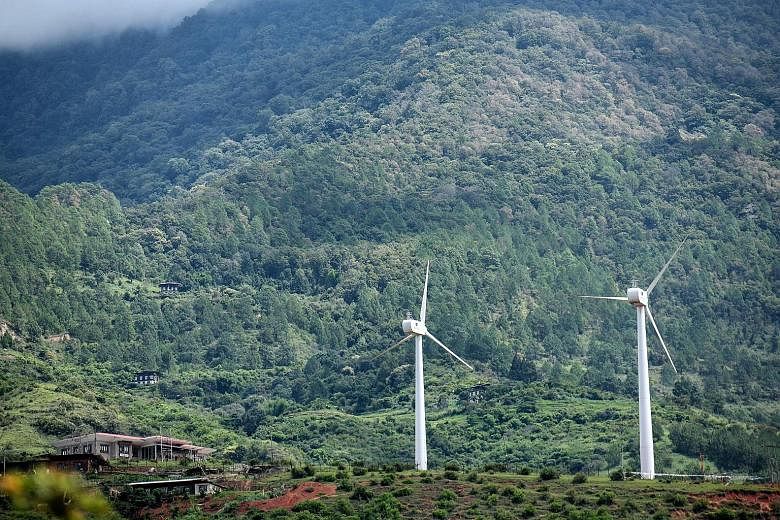PUNAKHA (Bhutan) • The gentle whirring of the wind turbine speaks volumes of Bhutan's record as the world's only carbon negative country, but major challenges stand in the way of the Himalayan kingdom's plan to follow a green path over rampant economic expansion.
The mountainous state absorbs three times more carbon dioxide than it emits, thanks mainly to the lush forests covering 72 per cent of its land. Famed as the "last Shangri-La" for using happiness as a measure of success, Bhutan has been careful to keep its environment pristine, often by sacrificing profits.
The nation of 800,000 has restricted tourist numbers with a daily fee of US$250 (S$345) per visitor in high season, helping keep at bay the kind of boom that has ravaged other scenic hot spots. In May, Bhutan opted out of an India-backed regional road connectivity project mainly over concerns that trucks coming in from other countries will pollute its air.
The constitution stipulates that at least 60 per cent of Bhutan must be covered in forest, putting a brake on farming and a potentially lucrative timber industry.
"There was a great temptation to dig into our forest wealth but we thought of the longer term," said Mr Dasho Paljor Dorji from Bhutan's National Environment Commission.
Under its 11th five-year plan, Bhutan aims to reduce substantially its forest fuel imports by 2020. It has just 100 electric cars so far but wants to increase numbers and plans to introduce a nationwide network of charging stations. In 2016, it installed its first wind turbines.
Being able to afford staying on a green path depends on Bhutan receiving outside funding, something in doubt since US President Donald Trump announced last year that the United States would withdraw from the 2015 Paris climate accord. Under that accord, wealthy nations agreed to set up an annual US$100 billion fund to help developing nations adapt to a heating planet.
Bhutan is keenly feeling the ravages of climate change, from melting glaciers, changing crop patterns to the spread of mosquito-borne diseases.
Temperatures have started touching 30 deg C, alarming locals unused to heat and humidity.
"Even the snowfall pattern has changed. Earlier it would snow for a few days, now it doesn't even last a day," said Bhutan's Chief Environment Officer Tenzin Wangmo.
Ms Wangmo said the warmer climes meant padi fields dot places like Bumthang that never grew rice in the past. "Climate change is not in our control. We haven't done anything but we are paying a heavy price," she said.
Mr Dorji said that Bhutan's contribution to the global community by keeping its carbon sinks intact and its nature as pristine as possible is a great one. "Our cause is worth supporting. We should be rewarded equally, if not more," he said.
AGENCE FRANCE-PRESSE

